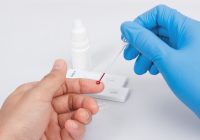Familial hypercholesterolemia, or FH, is a condition that runs in families and can cause high levels of ‘bad’ cholesterol. It’s inherited, meaning it’s passed down from parents to children.
FH is caused when there’s a problem with certain genes that regulate cholesterol levels in the body. In this blog, we’ll discuss familial hypercholesterolemia, its symptoms, types, and treatment options including private cholesterol tests in Kent.
What is Familial Hypercholesterolemia?
Familial hypercholesterolemia, or FH, is a genetic condition passed down through families. It’s caused by faulty genes, making the liver less efficient at removing excess ‘bad’ cholesterol, also known as LDL. This results in elevated LDL levels in the blood, increasing the risk of heart and circulatory diseases at an early age if left untreated.
FH is relatively common, affecting approximately 1 in every 250 individuals, with an estimated 270,000 people in the UK living with it. If one parent has FH, there’s a 50% chance of passing it on to their children.
What are the Symptoms of Familial Hypercholesterolemia?
Diagnosing FH can be challenging. However, familial hypercholesterolemia symptoms can be indicated by the following-
- Routine blood tests may reveal high cholesterol levels.
- Family history of premature heart disease or stroke may raise suspicion.
- Physical signs may include:
- Tendon xanthomata (swelling on knuckles, knees, or Achilles tendon).
- Xanthelasmas (small lumps of cholesterol around the eyes).
- Corneal arcus (a white ring around the iris).
What are Different Familial Hypercholesterolemia Types?
There are two types of FH:
1. Heterozygous Familial Hypercholesterolemia- Heterozygous FH occurs when altered DNA is inherited from one parent.
2. Homozygous Familial Hypercholesterolemia- Homozygous FH, rarer and more severe, results from inheriting altered DNA from both parents. People with homozygous FH face increased risks of coronary artery disease, often showing up during adolescence.
Can You Test for Familial Hypercholesterolemia?
Yes, genetic testing and lipid profile assessments are available to diagnose FH. These tests help identify genetic mutations associated with FH and assess cholesterol levels, aiding in early detection and treatment.
If you require a familial hypercholesterolemia test, visit Intrigue Health for private cholesterol testing.
What are Familial Hypercholesterolemia Treatment Options?
For people who have severe FH, specialised treatments and interventions may be necessary to reduce cardiovascular risks. Other treatment options include-
1. Lifestyle Modifications- Adopt a heart-healthy diet, engage in regular physical activity, and avoid tobacco products.
2. Medications- Statins and other cholesterol-lowering drugs may be prescribed.
Get Your Cholesterol Checked at Intrigue Health
Familial hypercholesterolemia is more than a medical diagnosis, it’s a condition that requires awareness, early detection, and proactive management. By recognising the symptoms, understanding the types, and exploring available treatment options, you can take control of your cardiovascular health.
At Intrigue Health, we prioritise comprehensive care, providing support and resources to make your heart healthy. Book an appointment with us for a cholesterol test in Kent.


